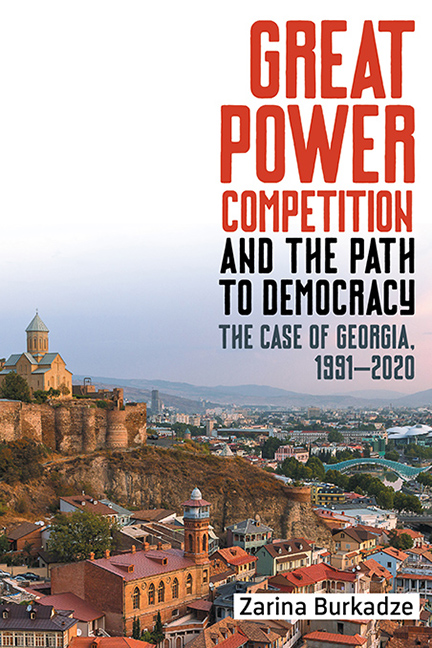Book contents
- Frontmatter
- Contents
- Preface
- List of Acronyms and Abbreviations
- Introduction: The Puzzle of Georgian Democratization
- 1 Autocracy and Democracy in Georgia: What Made the Difference?
- 2 Democratization without Great Power Competition, 1991–1993
- 3 Pluralizing Geopolitical Space, 1993–2003
- 4 The Dictatorship of Democrats, 2003–2012
- 5 Democratic Arrival? 2012–2020
- 6 Democracies In-Between
- Conclusion
- Appendix: List of Interviews
- Bibliography
- Index
Introduction: The Puzzle of Georgian Democratization
Published online by Cambridge University Press: 16 July 2022
- Frontmatter
- Contents
- Preface
- List of Acronyms and Abbreviations
- Introduction: The Puzzle of Georgian Democratization
- 1 Autocracy and Democracy in Georgia: What Made the Difference?
- 2 Democratization without Great Power Competition, 1991–1993
- 3 Pluralizing Geopolitical Space, 1993–2003
- 4 The Dictatorship of Democrats, 2003–2012
- 5 Democratic Arrival? 2012–2020
- 6 Democracies In-Between
- Conclusion
- Appendix: List of Interviews
- Bibliography
- Index
Summary
Following the collapse of the Soviet Union, newly emerged transitional regimes took up the challenging task of democratization. The United States and its Western European allies sought to support the emergence of democracies in place of the previous communist regimes. The United States outlined its main policy objectives for the new regimes: self-determination consistent with democratic principles, recognition of existing borders, building democracy, supporting the rule of law, protecting human rights and national minorities, and respecting international norms.
To achieve these goals, Congress passed the Freedom Support Act in 1992. In doing so, the United States established a project of democracy promotion, which drew on concepts similar to those found in the Marshall Plan that were designed to rebuild postwar Germany but was more spatially encompassing. Later, the European Union joined with the United States to facilitate democratic reforms and designed policies to promote good governance in the Eastern Partnership countries. The variation in democratic performance within and across regions was striking. Domestic conditions, geopolitical location, types of national leadership, amenability (or lack thereof ) to external demands, as well as the Soviet legacies, were commonly believed to account for these variations. Spreading liberalism and pressuring undemocratic leaders in the emerging democracies of Armenia, Azerbaijan, Belarus, Georgia, Moldova, and Ukraine proved a complicated task given the opportunity structures and the willingness of domestic actors to design democratic institutions.
Conventional wisdom in the field of democracy promotion holds that competition among great powers—that is, between promoters of democracy and autocracy—curtails processes of democratization because it reduces the effectiveness of democratizing efforts. The lesson drawn from this wisdom, therefore, is that such competition should be avoided or minimized so as not to disrupt the flow of democratic norms. These assumptions rely on a common juxtaposition which frames the West as “noble” and in opposition to “dirty,” non-Western powers working to interfere with the development of democracy. Arguments such as these often cite Eastern European states such as Latvia, Lithuania, and Estonia, which democratized without a substantive competition between great powers. But these arguments elide the fact that Russia reshaped the ethnic composition of these states by forced migrations before and during the Soviet period. Furthermore, the issue of ethnic minorities was used by Russia to impede the integration of the Baltic States into the Western political, economic, and military structures.
- Type
- Chapter
- Information
- Great Power Competition and the Path to DemocracyThe Case of Georgia, 1991-2020, pp. 1 - 22Publisher: Boydell & BrewerPrint publication year: 2022



